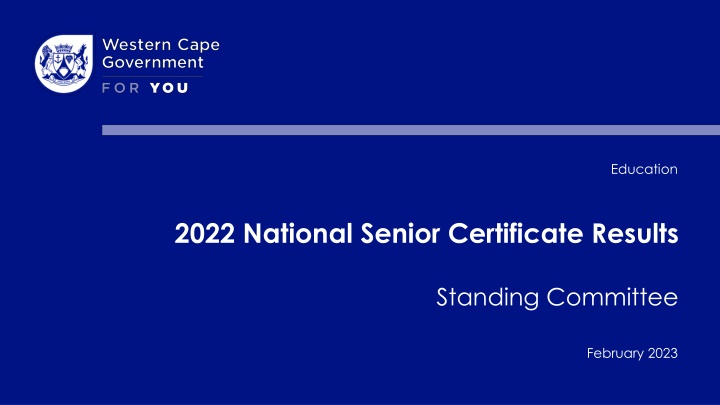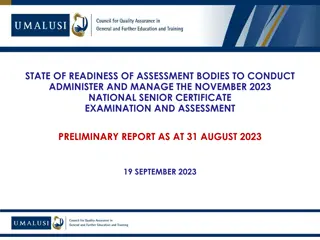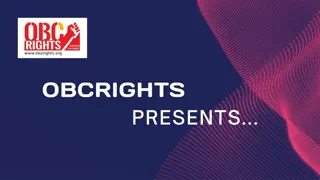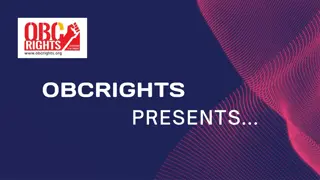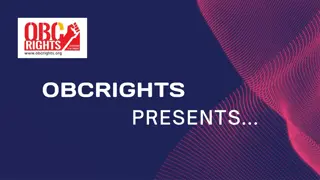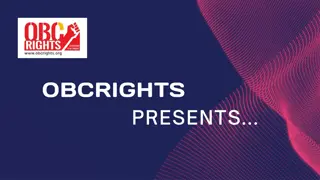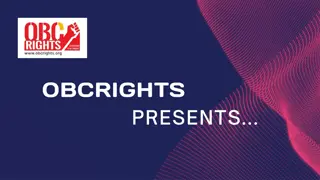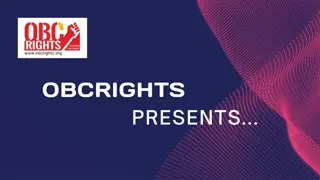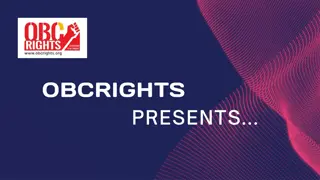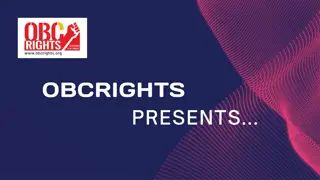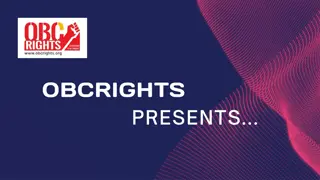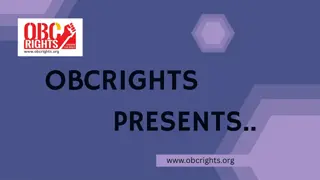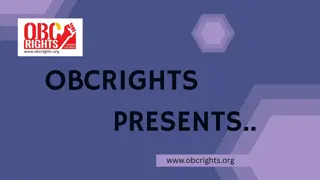Overview of 2022 National Senior Certificate Examinations
The 2022 National Senior Certificate (NSC) examinations involved meticulous preparation, including the creation of national question papers, secure distribution systems, and invigilation processes. Accommodations and concessions were provided for candidates with disabilities. The marking process was conducted at various venues, with competency tests in multiple subjects. Overall, the examinations were carefully monitored and managed to ensure fair and successful outcomes for all candidates.
Download Presentation

Please find below an Image/Link to download the presentation.
The content on the website is provided AS IS for your information and personal use only. It may not be sold, licensed, or shared on other websites without obtaining consent from the author.If you encounter any issues during the download, it is possible that the publisher has removed the file from their server.
You are allowed to download the files provided on this website for personal or commercial use, subject to the condition that they are used lawfully. All files are the property of their respective owners.
The content on the website is provided AS IS for your information and personal use only. It may not be sold, licensed, or shared on other websites without obtaining consent from the author.
E N D
Presentation Transcript
Education 2022 National Senior Certificate Results Standing Committee February 2023
1. Preparation for the 2022 NSC examinations: Magnitude and Monitoring 124 national question papers were written (including back-up papers for Life Orientation, Information Technology Paper 1 and Computer Applications Technology Paper 1 A total of some 32 000 000 images were printed. The question papers were distributed using a secure system which only allowed bags to be opened and closed on a specific date, time and location when an examination paper was written. Scripts were returned using this system. Magnitude of the NSC examinations The 2022 NSC Exam were written at 485 examinations centres (incl. combined centres). Examinations were monitored across all districts daily and reports were submitted to DBE and Umalusi. 64 ex-WCED officials served as monitors. Monitoring 2
1. Preparation for the 2022 NSC examinations: Invigilation Invigilation WCED used an invigilator system of 50% teachers and 50% community members and appointed 1 781 community invigilators. The 2022 NSC/SC Invigilators training was conducted, via Microsoft (MS) Teams, from 12-13 October 2022 for all eight (8) districts and all schools were provided with the presentation and videos of the training. It was compulsory for the following delegates involved in the conduct, administration and management of the 2022/23 NSC and SC examinations to attend the training sessions: Principals/centre managers (Chief invigilators), Two school Senior Management Team (SMT) members, Senior invigilators, District officials involved in the conduct, administration and management of the NSC and SC examinations in 2022/23. 3
1. Preparation for the 2022 NSC examinations : Accommodations and Concessions In total, 2 257 candidates (3,6% of registered candidates) had approved accommodations/concessions for the 2022 NSC examinations. Accommodation/Concessions e.g. Number of candidates Adapted paper for hearing impaired 23 Adapted paper for visually impaired 29 Accommodations are support mechanisms to ensure that learners with barriers to learning obtain an even opportunity to write the same examination as learners without a barrier to learning. Audio files 58 Braille papers 08 Enlarged papers (18 and 20 font) 43 Concessions are special approvals for e.g. exemption from a second language (another subject will be taken in lieu of the exempted language by immigrant learner or barriers) or spelling needs to be excused during marking Text to voice (computer reads paper) 65 Language exemption 171 immigrant learners 12 learners with barriers 4
2. Marking of the 2022 NSC examinations Marking took place from 08 December 2022 22 December 2022 at the 11 venues: CTLI, Western Cape Sports School, De Kuilen High, Brackenfell High Durbanville High, Wynberg Boys High, Wynberg Girls High, SACS, Groote Schuur High and Rondebosch Boys High. Markers wrote competency tests in 11 subjects: Accounting, Business Studies, Consumer Studies, Economics, English Home Language, Geography, History, Life Sciences, Mathematical Literacy, Mathematics and Physical Sciences. Some subjects were marked centrally at DBE: Agricultural Management Practices, Agricultural Technology, Music, Dance, SA Sign Language HL. English SAL & isiXhosa SAL marked in WC Marking position Number of markers 2018 64 60 71 469 2 856 3 520 Number of markers 2019 76 68 103 592 3 414 4 253 Number of markers 2020 74 73 98 489 2 397 3 131 Number of markers 2021 65 61 105 517 2 902 3 650 Number of markers 2022 75 72 129 558 2 899 3 046 Chief Markers Internal Moderators Deputy Chief Markers Senior Markers Markers Total 5
3. NSC results: Context of the 2022 cohort NSC WCED Registrations 2018-2022 examinations conducted for the 9th time in the CAPS context. 76 000 Number of candidates 71 000 66 000 62 350 full-time candidates across 457 examination centres registered for the 2022 NSC examinations. This cohort entered Gr 1 in 2011 the year when the NSC was written for the 4th time in Grade 12. 61 000 56 000 51 000 46 000 2018 53 768 2019 53 393 2020 54 785 2021 59 823 2022 62 350 Entered Policy on Progression (8th cohort) Discontinuation of the Policy on Multiple Examination Opportunity (MEO) Introduction of Sign Language Home Language in 2018 Introduction of Specialisation in the Technology Subjects in 2018 Offering 2 question papers in Accounting and Business Studies Abolishment of the designated list of subjects in 2018 The Class of 2022 was impacted by the following key policy changes: 6
3. NSC results: Distinctive educational context Trimmed ATP in Grades 10 and 11 Amended Programme of Assessment Grades 10 and 11 Cumulative effect of learning losses Need for Psycho-Social support Reduction in examinations and greater focus on SBA Learning under COVID-19 conditions for 2 years possibly the worst affected class with relation to the effects of COVID Subjected to the challenge of load shedding, service delivery protests disruptions 7
4. Summary: NSC examination results 2022 for the WCED Description 2018 2019 2020 2021 2022 Number of candidates who correctly wrote full examination 50 754 50 404 51 633 57 709 60 338 21 492 21 981 22 634 26 125 25 761 Bachelors Degree National Senior Certificate with access to Higher Education Number / % of total who wrote 42.3% 43.6% 43.8% 45.3% 42.7% Diploma 12 911 13 006 12 444 13 629 15 247 Certificate 6 913 6 477 6 141 7 090 8 071 Endorsed Certificate 33 38 31 30 23 NSC passes without access to Higher Education 1 0 0 1 0 Total number of passes 41 350 41 502 41 250 46 875 49 102 Percentage pass rate 81.5% 82.3% 79.9% 81.2% 81.4% 8
4. Summary: NSC Pass Rate 2018-2022 Grade 12 Pass Rate 2018 - 2022 82.5% 82.0% 81.5% 81.0% Percentage 80.5% 80.0% 79.5% 79.0% 78.5% 2018 81.5% 2019 82.3% 2020 79.9% 2021 81.2% 2022 81.4% % Pass 9
4. Summary: Overall NSC Results 2008-2022 Exam Total Wrote Total Pass % Pass Total Pass Bachelor % Pass Bachelor 2008 2009 2010 2011 2012 2013 2014 2015 2016 2017 2018 2019 2020 2021 2022 43 953 44 931 45 783 39 988 44 700 47 636 47 709 53 721 50 847 48 867 50 754 50 404 51 633 57 709 60 338 34 577 34 017 35 143 33 146 36 992 40 558 39 237 45 496 43 725 40 440 41 350 41 502 41 250 46 875 49 102 78,7% 75,7% 76,8% 82,9% 82,8% 85,1% 82,2% 84,7% 86,0% 82,8% 81,5% 82,3% 79,9% 81,2% 81,4% 14 522 14 324 14 416 15 215 16 319 19 477 18 524 22 379 20 804 19 101 21 492 21 981 22 634 26 125 25 761 33,0% 31,9% 31,5% 38,0% 36,5% 40,9% 38,8% 41,7% 40,9% 39,1% 42,3% 43,6% 43,8% 45,3% 42,7% 10
5. Pass rates with and without progressed candidates 2021-2022 Number of candidates with Bachelor's Degree access Number of candidates registered Number of candidates wrote Number of candidates passed % Bachelor's pass rate Exam % Pass rate 59 823 57 709 46 875 81.2% 26 125 45.3% All Progressed Candidates Non-progressed Candidates 2 172 1 870 538 28.8% 61 3.3% 2021 57 651 55 839 46 337 83.0% 26 064 46.7% 62 350 60 338 49 102 81.4% 25 761 42.7% All Progressed Candidates Non-progressed Candidates 2 323 2 030 537 26.5% 34 1.7% 2022 60 027 58 308 48 565 83.3% 25 727 44.1% 11
5. Progressed candidates 2018-2022 Bachelor s Degree access Higher Certificate access Year Entered Wrote Passed Diploma access 1 725 (51.0%) 579 44 236 298 3 384 2018 (33.6%) (2.6%) (13.7%) (17.3%) 717 81 281 354 2019 3 671 1 910 (37.5%) (4.2%) (14.7%) (18.5%) 687 55 267 (9.8%) 363 2020 3 216 2 730 (25.2%) (2.0%) (13.3%) 538 61 193 284 2 172 1 870 2021 (28.8%) (3.3%) (10.3%) (15.2%) 537 34 188 (9.3%) 315 2 323 2 030 2022 (26.5%) (1.7%) (15.5%) 12
6. WCED performance in 2022 NSC examinations 62 350 full-time candidates registered for the 2022 NSC examinations. With 60 338 who wrote, the turnout rate was 96.8%. The overall pass rate increased from 81.2% in 2021 to 81.4% in 2022. There was a decrease in access to a Bachelor s degree from 45.3% in 2021 to 42.7% in 2022. The Province had the highest Mathematics and Physical Sciences pass rates of 67.9% and 81.1% respectively. Four (4) districts achieved pass rates over 80%. Metro North achieved the highest Bachelor s degree access of 51.9% (incl. independent schools). The overall pass rate in the thirteen (13) ELSEN schools decreased from 90.0% in 2021 to 83.0% in 2022. 40.0% of their candidates passed with access to a Bachelor s Degree programme. 70 of the 457 schools (15.3%) in the Western Cape achieved a 100% pass rate. 92 schools maintained a pass rate of 95% and above for the past five years (2018-2022) indicating the ability to sustain excellent learner performance and functionality at these schools. 13
6. Overall performance: Quintile schools 2022 Number of schools per Quintile (Public Ordinary schools only) 23 34 164 69 89 Quintile 1 Quintile 2 Quintile 3 Quintile 4 Quintile 5 14
6. Overall performance: Performance per Quintile schools 2020-2022 Pass rate and Bachelor's Degree access rate per quintile (2020 - 2022) 100.0% 90.0% 80.0% 70.0% Percentage 60.0% 50.0% 40.0% 30.0% 20.0% 10.0% 0.0% 2020 2021 2022 2020 2021 2022 2020 2021 2022 2020 2021 2022 2020 2021 2022 Quintile 1 68.8% 27.5% Quintile 2 71.0% 29.6% Quintile 3 75.8% 32.5% Quintile 4 74.7% 30.2% Quintile 5 90.0% 62.3% % Pass % Pass Bachelor 71.4% 29.7% 71.0% 30.0% 67.2% 24.8% 70.0% 30.0% 71.7% 27.3% 76.0% 30.0% 73.1% 27.8% 76.0% 30.0% 89.2% 61.8% 90.0% 60.0% 15
6. Overall performance: Candidates per District in 2022 NSC Exams Percentage wrote in Districts 5% 4% 14% 17% 10% 16% 15% 19% Cape Winelands Metro North Eden Central Karoo Metro South Metro Central Overberg Metro East West Coast 16
6. Overall performance: Performance of Districts 2021-2022 Districts performance NSC 2021-2022 100.0% 90.0% 80.0% 70.0% Percentage 60.0% 50.0% 40.0% 30.0% 20.0% 10.0% 0.0% 2021 2022 2021 Eden Central Karoo 84.4% 46.4% 2022 2021 2022 2021 2022 2021 2022 2021 2022 2021 2022 2021 2022 Cape Winelands 76.5% 42.2% Metro Central Metro East Metro North Metro South Overberg West Coast % Pass % Pass Bachelors 78.0% 40.0% 83.0% 40.0% 84.2% 50.8% 85.0% 50.0% 77.3% 40.2% 78.0% 40.0% 86.2% 51.9% 86.0% 50.0% 80.3% 43.6% 79.0% 40.0% 81.8% 42.0% 84.0% 40.0% 80.8% 40.0% 79.0% 40.0% Increased pass % Maintained pass % of 70+ 17
6. Overall performance: Mathematics and Sciences 2021 2022 Subject Not Subject Avg Not Subject Avg Wrote AchievedAchieved Pass % Wrote AchievedAchieved Pass % 15 219 4 193 11 026 72,5% 45,2% 15 616 5 014 10 602 67,9% 43,1% Mathematics 42 272 8 891 33 381 79,0% 45,5% 44 544 5 393 39 151 87,9% 47,6% Mathematical Literacy 1 011 388 623 61,6% 35,1% 990 85 905 91,4% 43,3% Technical Mathematics 9 801 2 246 7 555 77,1% 48,6% 9 818 1 860 7 958 81,1% 48,7% Physical Sciences 1 099 195 904 82,3% 39,7% 1 105 95 1 010 91,4% 41,3% Technical Sciences 26 632 7 838 18 794 70,6% 44,4% 27 542 8 548 18 994 69,0% 42,4% Life Sciences 12 0 12 100,0% 64,8% 61 3 58 95,1% 55,8% Marine Sciences 18
7. Higher education access 2018-2022 Higher Education access 2018-2022 50.0% 45.0% 40.0% 35.0% Percentage 30.0% 25.0% 20.0% 15.0% 10.0% 5.0% 0.0% 2018 42.3% 25.4% 13.6% 2019 43.6% 25.8% 12.9% 2020 43.8% 24.1% 11.9% 2021 45.3% 23.6% 12.3% 2022 42.7% 25.3% 13.4% Bachelor Degree Diploma Higher Certificate 19
8. School achievement: Pass rate distribution of schools 2018-2022 Category 2018 2019 2020 2021 2022 Number of schools with a pass rate lower than 60% 45 38 52 40 31 20
9. School improvement: 2022 NSC performance comparative to 2021 Public Independent ELSEN Declined by more that 10% Declined between 5-10% Declined by less than 5% Improved by less than 5% Improved between 5-10% Improved by 10 to 20% Improved by more than 20% Maintained pass rate Maintained 100% 1st time Grade 12 35 36 96 96 46 34 9 24 20 1 5 4 9 8 6 6 3 4 2 1 1 0 1 0 4 6 4 24 24 7 21
9. School improvement: WCED macro analysis of 2022 NSC performance (excluding ELSEN) Public Independent Pass rate range Schools Wrote Achieved Failed Schools Wrote Achieved Failed 145 Schools had 6 718 failures = 11.7% of population 100% 28 3 489 3 489 0 36 940 940 0 90%-99% 103 15 545 14 921 624 15 966 926 40 80%-89% 73 10 853 9 143 1 710 5 181 156 25 70%-79% 89 14 128 10 603 3 525 7 182 138 44 60%-69% 56 9 515 6 322 3 193 3 160 101 59 50%-59% 20 3 204 1 748 1 456 0 0 0 0 Below 50% 8 913 401 512 1 11 5 6 377 57 647 46 627 11 020 67 2440 2266 174 22
10. Number of learners achieved/not achieved per age profile Candidates aged: <=17 18 19 20 21 22 23 24 25 26 Entered 6 381 32 081 13 427 5 556 1 799 466 78 15 2 3 Incomplete 109 597 624 381 151 36 9 1 1 1 Wrote 6 272 31 484 12803 5 175 1 648 430 69 14 1 2 Achieved 5 561 27 919 9492 2 993 721 131 16 3 Not Achieved 711 3 565 3311 2 182 927 299 53 11 1 2 23
10. Number of learners achieved/not achieved per age profile Performance of candidates per age 120.0% 100% 80.0% Percentage 60.0% 40.0% 20.0% <=17 1.7% 98.3% 88.7% 11.3% 18 1.9% 98.1% 88.7% 11.3% 19 4.6% 95.4% 74.1% 25.9% 20 6.9% 93.1% 57.8% 42.2% 21 8.4% 91.6% 43.8% 56.3% 22 7.7% 92.3% 30.5% 69.5% 23 24 6.7% 93.3% 21.4% 78.6% 25 26 Incomplete Wrote Achieved Not Achieved 11.5% 88.5% 23.2% 76.8% 50.0% 50.0% 0.0% 100% 33.3% 66.7% 0.0% 100% 24
10. Preparing for the May/June 2023 examinations Re-marking and rechecking registration closed on 03 February WCED will notify candidates once re-mark results are approved by Umalusi. NSC 202206 Registration closed on 08 February SC online registration closes closed on 08 February May / June exam scheduled to start on 03 May 2023 25
Other additional information: Feedback to districts and schools on the 2022 NSC results Subject, District and School data analysis and interpretation with Examination Publication Report supplied to Senior Curriculum Planners, Heads: Curriculum and Assessment Coordinators to be further mediated with Circuit Managers and Subject Advisors and used for planning and target setting. Districts supplied with their District results comparison of SBA vs Examination as well as an electronic interactive program of the per question analysis for each question paper. Districts were supplied with their overall circuit and school performance as well as detailed analysis of the performance in subjects at the district and school levels. Chief marker and internal moderator reports on the 2022 examination question papers supplied to Senior Curriculum Planners for engagement with Curriculum advisors. 26
11. School Improvement plans School improvement plans to support schools performing under 60% 27
11.1 Overall School Improvement Plan 1. Improve the pedagogical content knowledge and assessment practices of TEACHERS in all subjects by providing demand driven development opportunities that includes effective use of data 2. Coordinate a differentiated LEARNER support intervention targeting the marginalised and talented. 5. Integration ICT into teaching and learning The plans to enhance FET program improvement focuses on 5 thrusts: 3. Institutionalise effective curriculum management and assessment to enhance ACCOUNTABILITY at all levels. 4. Emphasis on learner participation on STEAMAC. 28
Class of 2023 Implementation Detailed Subject Packages being mediated Curriculum Roadshows in all districts Greater focus on support for schools in poorer quintiles Emphasis on progressed learners and learners at risk: 40% in grade 11 Change subject Home language Strong advocacy and communication to all stakeholders Maximum utilisation of support packages and participation in initiatives Telematics / Revision program / direct learner support 29
FRAMEWORK OF PLAN FOR UNDERPERFORMING SCHOOLS OBJECTIVES ACTIONS (These are to be broken down into specific activities, timeframes, roles and responsibilities which are to be monitored) Craft and confirm a set of criteria for the identification of targeted schools (underperforming and at-risk) 1.1 Use relevant data that includes, but is not limited to: a) DBE/WCED pre-determined criteria b) Data generated by monitoring tools/plans of schools, e.g. SSEs, APPRs, SiPs, etc. c) Academic performance: internal and external results (Systemic, NSC). d) Data in school visit reports e) Data from relevant surveys and evaluations (e.g. SEA) f) CEMIS data, e.g. learner enrolment, number of /overcrowded classes, learner and educator attendance stats, no-fee status, afterschool programmes etc. g) the subject offerings at high schools must be re-packaged and/or reduced to be managed more effectively in terms of context and interest. h) Education Provisioning Plans on-the-ground data: safety-related issues, quality of management, inappropriately qualified teachers, existing projects, etc. 30
Provide a systems/holistic approach to supporting targeted schools 2.1 Identify and confirm (as per the SIP) the needs of schools requiring support according to the intended outputs and outcomes by analysing the needs of the: a) learners b) Principal c) SMT d) educators e) SGB f) changing environment FRAMEWORK OF PLAN FOR UNDERPERFORMING SCHOOLS which focuses on: well-being and psycho-social support of all staff. creating safe work and learning environments for staff and learners. professional development of School Management Teams a variety of interventions for learners (camps, extra classes, nutrition, hostel accommodation, psycho-social support, etc.) capacitation of School Governing Bodies implementation and support of innovative delivery modalities supporting improved pedagogy targeting of selected educators (e.g. novice, underperforming, selected subjects, etc.) improving resource allocations (including human resources) to enhance teaching and learning. support and monitor assessment-related practices to support learner outcomes. providing high quality, developmental feedback to schools 2. Engage in collaborative planning which draws on or considers existing plans/programmes of: District officials WCED / DBE other provincial departments Municipalities Other relevant stakeholders a) b) c) d) e) 2.3 Set targets/milestones/indicators to measure/review progress ito: a) roll-out of support b) methods and approaches c) fulfilling of roles and responsibilities d) impact on performance/targets. 2.4 Manage business plans to ensure availability and optimal use of resources which include but are not limited to: a) funding b) LTSM (incl software) c) ICT requirements d) human resources e) networks f) managing risks 2.5 Execute the strategy focusing on: 1) fulfilling roles and responsibilities (incl. leads) 2) clear and regular communication 3) regular check-ins to monitor progress. 4) meeting of deadlines 5) unblocking roadblocks 31
FRAMEWORK OF PLAN FOR UNDERPERFORMING SCHOOLS Facilitate monitoring and evaluation processes to ensure accountability. 3.1 Design and implement a plan for monitoring which includes: a) dates for reflection sessions. b) participants in sessions. c) tools/reports/documents to be used to access data. d) status of resources. e) how to assess progress against outputs. f) how to assess efficiency of the team quality of outputs. 3.2 Facilitate assessing progress making recommendations for improvement via: a) regular meetings b) designing a report management mechanism c) ensuring that relevant recommendations are passed to key decision makers/managers. 3.3 Ensure that guidelines, and recommendations are followed through by: a) effecting changes to the programme and/or implementation plans b) giving recognition to implementers or project teams c) implementing risk mitigation d) regular reporting. 32
12. Wellness Career Guidance / Expo Tutor Camps Mental Well-being Study Skills/ Methods/ Motivation / Resilience Growth / Change Mindset Grade 12 Psycho-social Support in Specialised Support Services Emotional Regulation Trauma Informed Classrooms/ Schools Parent Support Sessions Circle of Courage
Psycho-social Support in Specialised Support Services
Conclusion Given the turbulent context since 2020, the WCED with the collective efforts of all officials, learners, parents, stakeholders and parents have managed an improved pass rate. The conduct, management and administration of the National Senior Certificate was successfully undertaken. The WCED will once again strive to ensure that the class of 2023 is supported to achieve the best possible outcome i.e. improvements on all criteria based on realistic rates of progression 35
